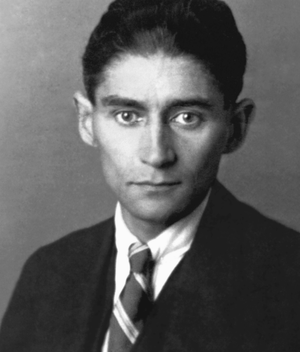£1m AHRC Award to Kafka Project

Hosted by the Oxford Kafka Research Centre, of which Prof Murnane is a co-director, the project takes the idea of community as a lens through which to assess Kafka’s wider contexts and afterlives and to ask how his works could attain their iconic status as ‘world literature’: 'Our project will mark the centenary of Kafka’s untimely death in 1924 by connecting scholars and artists around the globe, and by engaging with general readers and different groups and communities across the UK and beyond', says Professor Murnane.
Kafka’s engagement with community acts as the springboard for the project’s distinctive approach, which is structured around three themes. The first theme “Community” will highlight Kafka’s deep and sustained engagement with forms of communal life in light of his Jewish and Austro-Hungarian contexts around 1900. Kafka has typically been seen as a lonely bachelor whose texts are concerned with isolation and alienation, but this project will focus on depictions of collectives in his texts to challenge such established views.
" Our project will mark the centenary of Kafka’s untimely death in 1924 by connecting scholars and artists around the globe, and by engaging with general readers and different groups and communities across the UK and beyond " Professor Barry Murnane

The second theme 'Worldliness', which will be led by Professor Murnane, widens this focus to consider Kafka’s role as a world author. He will not only ask how Kafka has been read and seen by different communities in different times and places, but will also take his own engagement with questions of empire and ecology in a globalising world to assess what role this has played in transforming him into a world-literary writer.
'Few writers gain the iconic status that Kafka has', says Professor Murnane, 'and almost everyone can associate something with the adjective Kafkaesque. But how many readers know that Oxford holds the largest collection of Kafka’s manuscripts in the world?' This is only one of the central questions this strand will be discussing.
The third theme is entitled 'Transformation' and will assess Kafka’s legacy in different art forms and media. This strand is built around an ambitious programme of outreach and cultural engagement and puts the experience of general readers, and of different groups and communities, centre stage. As such, the project will fund creative partnerships with leading artists and cultural institutions, including a Kafka exhibition at the Weston Library in Oxford and the Morgan Library in New York (to mark the 2024 centenary), a dance adaptation of ‘A Hunger Artist’, radio dramas of The Trial and America, new songs, and a new anthology of short stories inspired by Kafka.
Two conferences, Kafka Transformed (2024) and Kafka in the World: Life, Death and Afterlife (2025), will connect scholars from different disciplines around the world. Travel bursaries will encourage the participation of freelance artists, Early Career Researchers and academics based in emerging economies. The project also includes a new Global Kafka Network and a Digital Kafka Resource. The latter will host media content aimed at younger audiences, introducing Kafka to a new generation of readers.
You can stay up to date with the project’s activities on the Oxford Kafka Research Centre website and by looking out for news on the St John’s website.